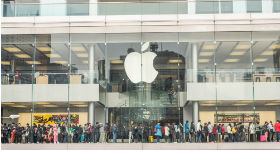Traditional storefronts are a sea of contradictions these days. Radio Shack has gone bankrupt while Staples and Office Depot are merging. Both moves will result in opening up more real estate, but there seems to be no shortage of potential customers to fill up space. The irony is the new occupants are likely not to be traditional retailers, but online retailers moving out of the virtual and closer to your neighborhood.
Creditors are currently fighting over what's left of Radio Shack's assets, including around 1,732 Radio Shack storefronts around the country, a piece of the 4,000-ish total inventory when the company filed for bankruptcy in early February. Hedge fund Standard General wants to see if it can use its $111 million in secured debt to buy and continue operating the Shack, instead of its assets being liquidated and the proceeds distributed among the creditors.
If it wins, Standard General will co-brand the stores with Sprint, an interesting strategy to give the wireless carrier a larger walk-in footprint against AT&T, T-Mobile and Verizon. Sprint already owns about 1,100 stores and also sells phones through Best Buy, so if the deal goes through, Sprint will effectively get more than a doubling of storefronts.
But what about all the rest of the Radio Shack stores, plus the space that will be freed up from consolidations when Staples and Office Depot merge? There are a number of companies that have to be looking over the distressed real estate, including Amazon, Google, and Microsoft.
Amazon is all about speed these days, having announced the launch of one-hour delivery service in select zip codes in Baltimore and Miami this week. The company started one hour delivery in Manhattan in December, expanding to Brooklyn in February. Earlier this year, Amazon opened up a million square foot distribution center in Baltimore to support same day delivery in the area.
While Amazon has launched numerous electronic storefronts, it could ultimately end up in retail, blending its combination of on-line, same day/next day order fulfillment. The company reportedly was going to open up a downtown location in Manhattan last fall to handle pickups,
 Image via Shutterstock
Image via Shutterstock
returns, and even serve as a storefront to showcase its original electronic devices.
Analysts are not keen on storefronts, since they cost big money and detract from the online story. However, Microsoft and Google have followed Apple into the storefront category. It's no stretch to see Amazon doing the same thing.
Microsoft has 133 storefronts in the U.S. and Canada, giving the company the ability to showcase its Xbox game console, software, tablets and smartphones along with third-party software and hardware. It also features pop-up/store-within-a-store retail space with the Best Buy and Future Shop retail outlets, but dedicated storefronts give Microsoft the opportunity to showcase the best attributes of its products. I don't expect Microsoft to snatch up many Radio Shack locations, since it wants to look upscale.
Google has a pop-up within a London store and it was reportedly planning to have a pair of waterfront barges it could drag around to show off its products, until the Coast Guard shut them down due to safety concerns. I could see Google experimenting with store fronts, just like it dabbles in fiber, wireless technologies, in a dozen or more other areas. Radio Shack real estate would come cheap and could be economically dressed up to showcase the company's Play store – an area it needs help in when it comes to selling content beyond Android apps – and partner hardware and software. Storefronts could also help if Google gets more serious about being a U.S.-based MVNO, since wireless seems to lend itself to walk-in customers.
Amazon probably won't be a Shack shopper. It needs larger storefronts for storage and same-day/one-hour shipping. Look for the company to pick up some surplus real estate once Staples and Office Depot consolidate, as well as experimentation with perishable goods. Maybe I'm a Luddite, but I actually like to go to the store to pick up my milk, bread, fruit, and vegetables. I suspect Amazon would need to experiment with offering things that need refrigeration or otherwise go bad over time.